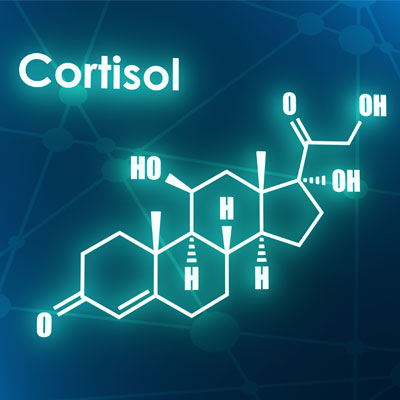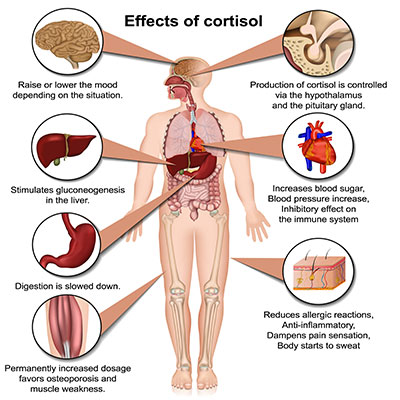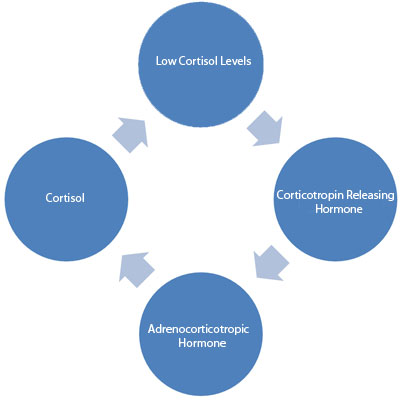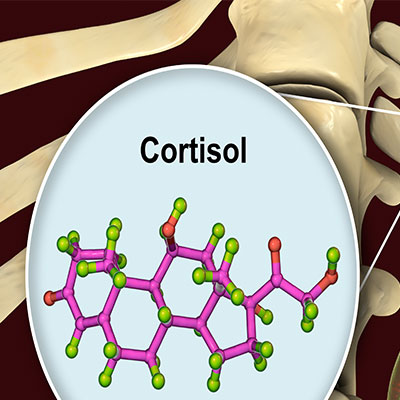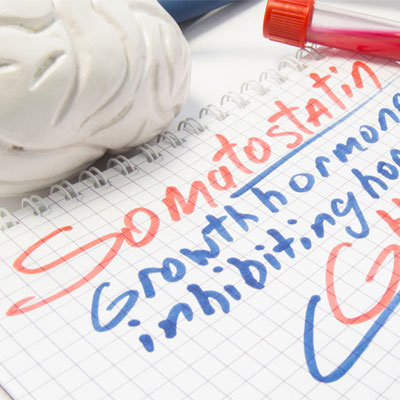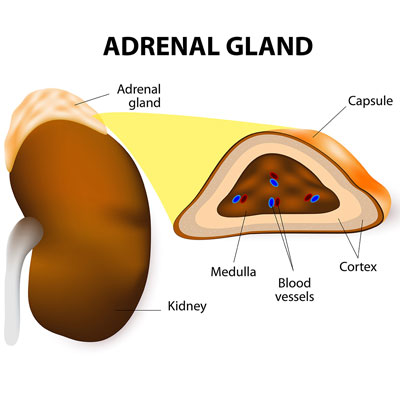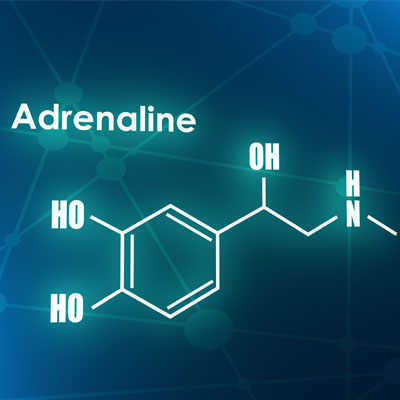Contents
- What Is Cortisol Hormone?
- What does cortisol do in the body?
- How Is Cortisol Hormone Regulated?
- Where is cortisol produced?
- When Happens with High Cortisol Hormone Levels?
- How Do You Test Cortisol Hormone Levels?
- The Impact of Outside Stress on Cortisol Hormone
- How Does Cortisol Hormone Affect Other Hormones?
- How Can You Balance Cortisol Hormone?
We often think of cortisol hormone as being the chemical that the body secretes when it is under stress. While it is true that cortisol is the “stress hormone,” there is much more to it than that.
Every chemical messenger (hormone) in the body has a purpose. For some, that purpose is limited to one function. It may be to stimulate the secretion of another hormone. Some hormones inhibit the production of other such chemicals. Finally, there are those hormones that play a role in numerous critical functions, as is the case with cortisol.
The cortisol definition is as follows: a steroid hormone produced by the Trusted sourceJohns Hopkins MedicineAdrenal GlandsGo to sourceadrenal glands responsible for regulating many bodily processes. Cortisol is also another name for hydrocortisone, a medication prescribed by doctors to treat inflammation resulting from, asthma, rheumatism, psoriasis, and eczema.
In this review, we will discuss the following:
- The function of cortisol and what it does in the body
- How cortisol is regulated
- The effect of low and high cortisol levels in the body
- How to test cortisol levels
- The impact of stress on cortisol levels
- Cortisol’s influence on other hormones
- How to balance cortisol levels
Cortisol, also known as the stress hormone, exerts influence on many functions in the body.
What Is Cortisol Hormone?
It would be easy to declare cortisol hormone as the stress hormone and leave it at that. After all, the body secretes increased levels of cortisol when it is under stress. That is why it is known as the “fight or flight” hormone. The fact is that balanced cortisol levels play a role in maintaining a healthy body.
Cortisol – Steroid hormone
Cortisol is a hormone that falls under the category of steroid hormones. In addition to helping the body react to stressful situations, cortisol influences immune system responses as well as supporting a healthy metabolism. Cortisol is a glucocorticoid, a classification of steroid hormones produced by the adrenal glands.
What does cortisol do in the body?
When you consider the fact that most of the body’s cells contain cortisol receptors, it becomes easy to understand how cortisol hormone function can vary depending on the cells it is acting on at any given moment.
Here are some of the primary functions of cortisol hormone:
- Anti-inflammatory
- Balancing water and salt levels
- Blood sugar regulation
- Controlling sleep/wake cycle
- Energy booster
- Fetal development
- Influencing memory formation
- Regulating blood pressure
- Supporting metabolism
One of the interesting facts about cortisol is that it can alter its actions on the body based on the needs of the moment. For example, in cases of extreme stress, cortisol can inhibit certain functions, such as immune responses, growth, hormone production, reproduction, or even digestive processes.
When faced with a stressful situation, cortisol acts in the following ways:
- It floods the body with glucose to supply energy to the large muscles, so they have the power to react and act (fight or flight)
- Cortisol inhibits insulin production to prevent glucose storage – as the body needs the glucose in the bloodstream for immediate use
- It narrows arteries at the same time that epinephrine entering the bloodstream increases the heart rate – these actions force the heart to pump blood faster and harder
- Once the situation clears, cortisol levels return to normal
The role of cortisol hormone in the body depends on the cells it acts upon at any given moment.
How Is Cortisol Hormone Regulated?
Cortisol secretion begins with the pituitary gland. No, that is not where cortisol production occurs, that is where triggering hormones come from to start the process. Actually, we can even go further back to the hypothalamus that measures the amount of cortisol in the bloodstream. If the hypothalamus senses cortisol levels that are too low, specific cells there secrete a hormone called corticotrophin-releasing hormone (also spelled corticotropin-releasing hormone, CRH) to the pituitary gland.
That is the first step in the hypothalamic-pituitary-adrenal axis. Next, the pituitary gland responds to the influx of CRH by releasing adrenocorticotropic hormone (ACTH) into the bloodstream to stimulate cortisol production.
Where is cortisol produced?
Cortisol hormone production occurs in the adrenal glands (located on top of the kidneys) once they detect elevated levels of ACTH in the bloodstream. As cortisol enters the bloodstream, it signals the hypothalamus to decrease CRH secretion. That action results in a reduction of ACTH release into the bloodstream. Eventually, declining ACTH levels result in a decrease in cortisol production. As the levels of cortisol in the bloodstream decline, the hypothalamus senses this action and increases CRH secretion once again in what is called a negative feedback loop. You can see the process in the figure below:
When cortisol levels are low, the hypothalamus releases CRH to the pituitary gland which secretes ACTH to the adrenals to produce cortisol.
What Happens When Cortisol Hormone Levels Are Low?
Trusted sourceWhat is a hormonal imbalance?HealthlineGo to sourceHormonal imbalance is a problem no matter what the hormone, or whether it is low or high. Because hormones interact with other chemicals, one imbalance can begin a spiraling effect. The same can be said for having low cortisol.
What does cortisol do to the body if its levels decline too low?
Having a low cortisol level can manifest in the following symptoms:
- Abdominal pain
- Continual fatigue
- Darkened skin patches
- Dizziness (especially when you stand up)
- Mood changes
- Muscle weakness
- Nausea
- Vomiting
- Weight loss
When your body does not produce enough cortisol hormone, it results in a rare condition called Addison’s disease if the problem originates in the adrenal gland. Symptom onset is a gradual process. You will not notice this occurrence overnight. If left untreated, low cortisol levels could result in a life-threatening condition. Also called primary adrenal insufficiency, Addison’s is an autoimmune disease that must be taken seriously.
Low cortisol levels can indicate Addison’s disease, a potentially life-threatening condition if left untreated.
When Happens with High Cortisol Hormone Levels?
High cortisol levels are just as bad for the body as low ones. Aside from keeping the body on high alert all the time, having too much cortisol can manifest with the following symptoms:
- Acne
- Anxiety
- Depression
- Diabetes due to cortisol rendering the cells insulin resistant
- Facial hair growth
- Flushed, round face
- Frequent urination
- Increased thirst
- Insomnia
- Irregular menstrual periods (women)
- Mood swings or irritability
- Muscle weakness
- Osteoporosis
- Thinning skin that bruises easily and heals slowly
- Weight gain (especially in the chest, face, and abdomen) in conjunction with slender arms and legs
If cortisol hormone levels stay elevated for extended periods, loss of sex drive could occur. Prolonged elevated cortisol levels can lead to Cushing’s syndrome.
Continually high cortisol levels keep reducing inflammation, while also suppressing the immune system. That can increase the risk of illness, cancer, food allergy development, autoimmune disease, and gastrointestinal problems. Ongoing stress on the heart from the body remaining in a state of fight or flight can lead to cardiovascular disease.
Issues that can cause high cortisol levels include a pituitary or hypothalamic tumor increasing CRH or ACTH secretion. An adrenal tumor can also increase the release of cortisol into the bloodstream. Some drugs can also influence cortisol production, such as prednisone and estrogen-containing medications. It is extremely important to understand how to reduce cortisol levels if they become too high.
Elevated cortisol levels can lead to Cushing’s syndrome if left untreated.
How Do You Test Cortisol Hormone Levels?
There are various methods of how to check cortisol levels, including blood, urine, and saliva. Some doctors will run a blood cortisol test consisting of two blood sample collections in one day. The first will take place in the morning, and the other around 4 pm. The reason for this is that cortisol levels vary significantly throughout the day. Some doctors only measure in the morning when cortisol levels are often at their high point.
If you have normal cortisol levels, there is no need for further testing. The normal range for serum cortisol levels is between 10 and 20 mcg/dL. However, if your cortisol levels range is not normal, the doctor may follow this up with either saliva or urine testing.
The saliva test for cortisol to detect Cushing’s syndrome is about 90% accurate. In this test, you will collect a saliva sample between 11 pm and midnight when cortisol levels should be at their lowest point of the day.
The urine test for cortisol hormone measures all urinations during a 24-hour period. You will use a separate container to collect a specimen every time you go to the bathroom during the day.
Cortisol levels may be tested by blood, saliva, or urine.
The Impact of Outside Stress on Cortisol Hormone
As the stress hormone, cortisol levels tend to rise when we are at our most anxious moments. Cortisol is meant to impact the body for a short time until the underlying stressful situation passes.
What happens if the body stays in a state of high-alert and does not calm down? We see this with people who have extremely stressful jobs, or those dealing with a stressful situation such as a divorce, death, or severe illness. At that time, it is as if the internal alarm in the body stays on, causing cortisol levels to remain high.
When cortisol hormone levels stay at an elevated state for an extended time, it can cause certain health problems that can interfere with well-being, including:
- Agitation and anxiety
- Depression
- Digestive issues
- Headaches
- Heart disease
- Insomnia
- Memory impairment
- Poor focus
- Weakened immune system responses
- Weight gain
Impaired cortisol function can feel like being on a merry-go-round that never ends. Instead, it only goes faster and faster, leaving you no way to get off.
Continual stress keeps cortisol levels elevated, increasing the risk of other health issues.
How Does Cortisol Hormone Affect Other Hormones?
Many hormones influence others. Is cortisol a hormone that affects other hormone levels?
Yes, cortisol effects are seen in many other hormone levels. Ultimately, high levels of cortisol hormone influence the following hormones:
- Growth hormone and testosterone: these two hormones experience their largest release into the body while you sleep at night. It is imperative for adults to get between 7 and 9 hours of quality sleep. Anything less reduces the amount of time spent in slow-wave sleep when hormone production occurs. Elevated cortisol levels in the evening prevent the body from entering a state of relaxation. That makes it difficult to fall asleep. Ensuing insomnia reduces testosterone and growth hormone levels. In turn, all functions of these two hormones begin to suffer, including GH stimulation of insulin growth factor 1. Immunity, metabolism, libido, cell regeneration, and brain functions all face decline.
- Cortisol also stimulates the hormone ghrelin, which causes the body to feel hunger. Ghrelin prompts you to eat more for energy, which runs low without enough growth hormone and testosterone. As a result of increased ghrelin, you tend to overeat and gain weight.We have already discussed the effects of cortisol on insulin, and because it acts on every cell in the body, it could be said that cortisol interferes with many of the hormones and their functions. Cortisol also interferes with other sex hormone production.
High cortisol levels interfere with the production of many critical hormones, including testosterone and growth hormone.
How Can You Balance Cortisol Hormone?
If you have low cortisol hormone levels, your doctor may prescribe hydrocortisone tablets to increase cortisol levels. Corticosteroids help with Addison’s disease, inflammatory conditions such as asthma, and skin conditions such as psoriasis. Long-term use of corticosteroids can increase the risk of the following side effects:
- Cataracts
- Cushing’s syndrome
- Depression
- Diabetes
- Glaucoma
- High blood pressure
- High blood sugar
- Increased infection risk
- Rapid mood changes
- Osteoporosis
- Suicidal thoughts
- Thinning skin
- Weight gain
Your doctor will want to use corticosteroids for the shortest time possible.
If you have elevated cortisol levels, it is essential that you learn how to lower cortisol as soon as possible. In many instances, this can be done through stress management and diet.
Some of the ways to manage stress include:
- Acupuncture
- Breathing techniques
- Counseling
- Exercise
- Massage
- Mediation
- Sleep
- Yoga
An anti-inflammatory, low-glycemic diet is crucial to lowering cortisol levels. Some of the foods that reduce cortisol include:
- Vegetables
- Fruits
- Nuts
- Seeds
- Beans
When you are learning how to lower cortisol levels, keep these things in mind:
- Reduce intake of saturated and trans fats
- Decrease caffeine and alcohol
- Eat a high fiber diet
- Lose weight
- Exercise
- Take omega-3 fatty acids and probiotics
If you are also diagnosed with growth hormone or testosterone deficiency, the doctor may suggest hormone replacement therapy, which will help lower cortisol levels.
- Do Yup Lee, PhD, Eosu Kim MD, PhD, Man-Ho Choi, PhD
- Louis M Muggeo, PsyD, Dr. David Fedele, Ph.D., Dr. A. Tiengo, Michele Molinari, MD, MSc, FACS, G. Crepaldi
- Jarrett Eshima. PhD, Dr. Trenton J. Davis, Heather D Bean, PhD, John Fricks, PhD, Barbara Smith, PhD, BSc
- H.Vierhapper, PhD P.Nowotny, W.Waldhäusl
- Dr. Jill Kanaley PhD., Dr. Judy Y. Weltman, Dr. Karen S. Pieper PhD., Arthur Weltman Ph.D., Dr. Mark L. Hartman
- George Davey Smith, Yoav Ben-Shlomo, Andrew Beswick, John Yarnell, Stafford Lightman, and Peter Elwood.
- Dr. James Leonette
- Jeff S. Volek, William J. Kraemer, Jill A. Bush, Thomas Incledon, and Mark Boetes
Technical and clinical aspects of cortisol as a biochemical marker of chronic stress
Human growth hormone and cortisol response to insulin stimulation in aging
A Metabolomic Approach for Predicting Diurnal Changes in Cortisol
Treatment with growth hormone suppresses cortisol production in man.
Cortisol and Growth Hormone Responses to Exercise at Different Times of Day
Cortisol, Testosterone, and Coronary Heart Disease
How to boost testosterone and reduce cortisol levels to lead better
Testosterone and cortisol in relationship to dietary nutrients and resistance exercise

